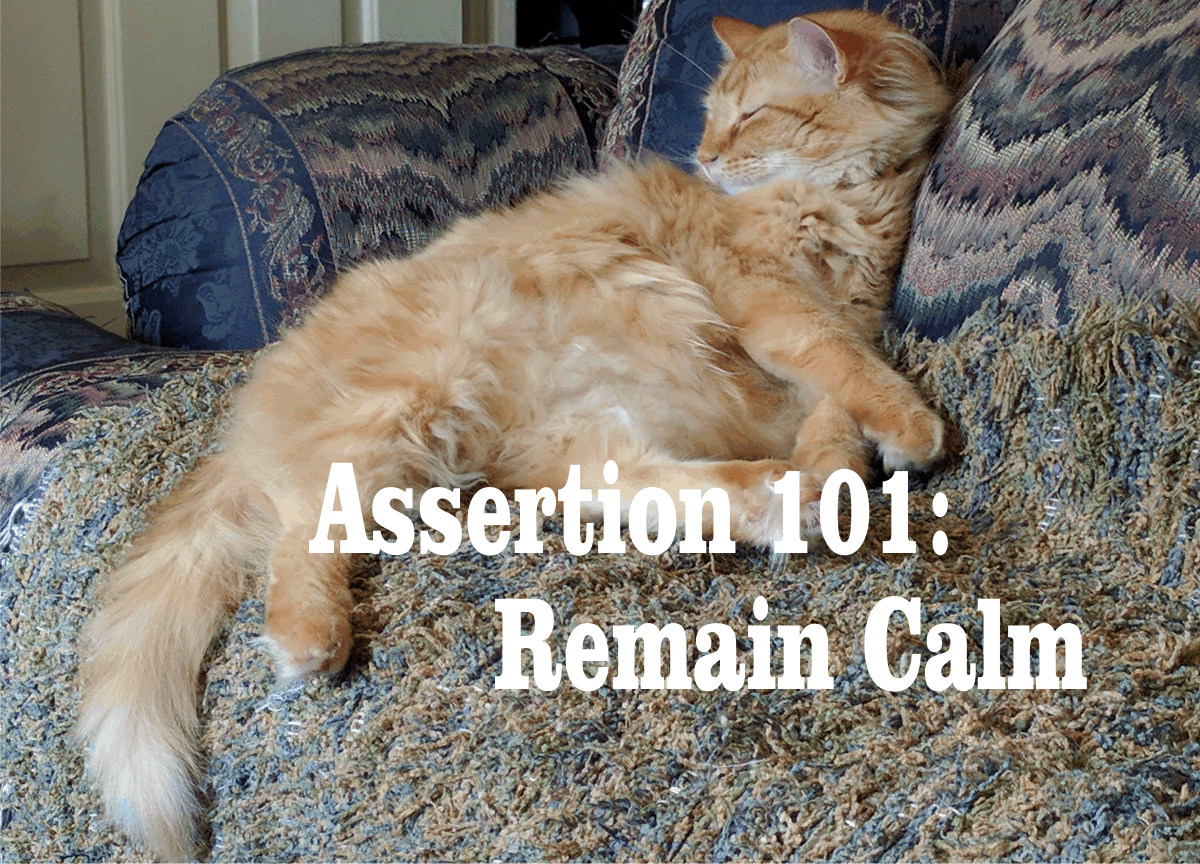
Excel At Life
Contents
About▼
Articles▼
Audios▼
Questionnaires▼
Topics
Excel At Life, LLC,
Missouri, USA
Site Last Modified: January 14, 2024











Popular Articles
Crazy-Makers: Dealing with Passive-Aggressive People
Why Are People Mean? Don't Take It Personally!
Struggling to Forgive: An Inability to Grieve
The Secret of Happiness: Let It Find You (But Make the Effort)
20 Steps to Better Self-Esteem
7 Rules and 8 Methods for Responding to Passive-aggressive People
What to Do When Your Jealousy Threatens to Destroy Your Marriage
Guide to How to Set Achieveable Goals
Catastrophe? Or Inconvenience?
Popular Audios
Audio Version of Article: Crazy-Makers: Passive-Aggressive People
Audio Version of Article: Why Are People Mean? Don't Take It Personally!
More PsychNotes: Communication
Assertion 101: Remain Calm
by Monica A. Frank, PhD

I've noticed in my responses to readers asking about managing a passive-aggressive (PA) person, I often note, “And be sure to say this calmly.” When conflict occurs, often the person who can remain calm is the one in control of the situation. But remaining calm is easier said than done for many people especially when confronted by a PA or aggressive person.
Conflict situations when remaining calm can be helpful:
1) Someone has aggressed against you. When someone is taking an aggressive approach, they are seeking aggression or control. Therefore, the more calm you can remain, the more likely you are able to defuse the situation. My training in a psychiatric inpatient unit for paranoid and schizophrenic patients emphasized the importance of being calm when confronted by an aggressive patient.
My karate training also stressed the importance of remaining calm when confronted by an aggressive stranger. Karate taught me to take a stance that appeared to be non-aggressive: stay relaxed, put hands up casually facing outward, slightly back away, and talk calmly. The hope was that we could talk the other person down from aggression but we were also getting in a prepared stance to allow a quick reaction to a physical assault.
So no matter the type of conflict, when confronted by an aggressive person, remain calm, talk low and slow, while looking for an exit from the situation.
2) PA behavior. A person who is PA is wanting to escalate conflict to make you look like the bad guy. The more you remain calm, the less effective the PA behavior is so the PA person does not achieve his/her goal.
3) Trying to solve an unfair situation. When you are frustrated by a situation such as trying to get a car repaired correctly or resolve a dispute with a utility company, the tendency is to become angry. However, showing anger makes the other person defensive and less likely to be amenable to any solutions. Remaining calm helps you to better negotiate frustrating situations.
How to remain calm
1) Practice. Don't think that when a difficult situation arises that you can just calmly respond. Remaining calm is a skill that needs to be created through practice. Sometimes that practice can be done imaginally but if you have a particularly difficult time with it, do role-playing with someone else. For example, both in my training at the psychiatric hospital and in karate we practiced being confronted and remaining calm.
2) Breathing. One of the best quick methods for calming yourself is taking a deep breath. However, this also may not be very effective without practice. The better you are at the relaxation methods, the more effective a single deep breath can be in calming you. So, as indicated above, practice can also help with learning how to calm yourself rapidly. Knowing how to relax doesn't just give the appearance of being calm. Instead, you ARE calm. As a result, you are less likely to show tells of anger.
3) Plan. Most situations don't have to be resolved immediately. You can leave a situation and return to it later when you are calmer. Whether you tell the other person “I'll get back to you about this” or you pretend to have an important appointment (or phone call), you can plan a better time when you have mapped out a strategy and can contain your anger.
More Communication TipsPermission to post this article is granted if it includes this entire copyright and an active link.

More PsychNotes
Communication

- In Praise of Specific Praise
- Be Careful Accusing Someone of Lying
- Assertion 101: The Importance of Eye Contact
- Steps to Reduce Holiday Stress When Encountering Family Demands
- Assertion 101: You Have the Right to Say “I Don't Care”
- People-pleasing 101
- When Emotional Reasoning Interferes With Having a Dialog About Micro-aggressions
- Handling Passive-Aggressive Emoticons
- Assertion 101: Don't Apologize for a Request
- Assertion 101: Just Say “No”
- Do You Understand Me? Conflict in Relationships
- When Doctors Don't Listen
- Is Your Boss Unfair? What You Can Do About It
- “I've Been There” Doesn't Always Mean “I Support You”
- Value Your Partner to Reduce Feelings of Rejection During Disagreements
- Making an Assertive Complaint
- When to Criticize Your Partner
- Marital Conflict: When Bad is Good and When It's Bad











